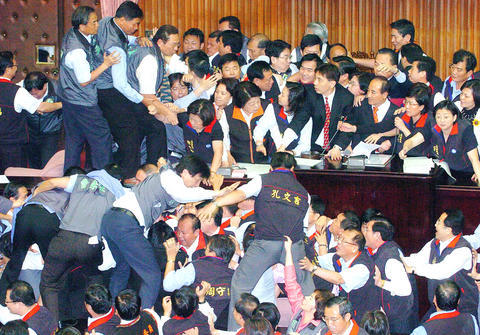In what has become a signature of legislative politics, lawmakers yesterday began brawling on the legislative floor over a controversial piece of legislation.
The brawl began over a Chinese Nationalist Party (KMT)-proposed bill that would make the Central Election Commission (CEC) an organization whose members are selected in proportion to a party's number of seats in the legislature.
The conflict erupted after Legislative Speaker Wang Jin-pyng (王金平) tried to open yesterday's plenary session, which was scheduled to review the CEC organic law (中選會組織法).

PHOTO: SUNG CHIH-HSIUNG, TAIPEI TIMES
This was to be followed by a review of this year's government budget request.
Wang was initially unable to enter the chamber, as scores of Democratic Progressive Party (DPP) lawmakers cornered him in the speaker's break room in the rear part of the chamber.
He finally managed to escape and made his way into the chamber after KMT lawmakers rushed the DPP blockade and shoved their way through their opposing lawmakers.
But Wang was still unable to preside over the meeting.
Dozens of pan-green lawmakers rushed at Wang from his right and pushed him from the dais, despite a scrum of dozens of pan-blue lawmakers who were trying to push back from Wang's left.
Non-Partisan Solidarity Union Legislator Yen Ching-piao (顏清標) tried unsuccessfully to use his large physical presence to try to create a corridor for Wang.
Police stood by during the melee and did not try to intervene.
The wrestling left several legislators injured, with three medical personnel treating the casualties right on the floor.
The meeting then went into a recess.
Lawmakers who took part in the scuffle blamed the other side for the fight.
"Former KMT chairman Ma Ying-jeou (馬英九) has to take responsibility for today's incident, because he asked the KMT caucus whip to boycott talks on the controversial CEC bill," DPP legislative caucus whip Ker Chien-ming (柯建銘) said.
Ker said the KMT legislative caucus went back on a promise they had made on Monday that they would participate in party negotiations between Wang and Premier Su Tseng-chang (蘇貞昌).
But KMT legislative caucus whip Tseng Yung-chuan (曾永權) denied Ma was responsible, saying the negotiations were simply a "delaying tactic" by the DPP to block the CEC bill.
After a meeting with Wang yesterday afternoon, KMT legislative caucus whips eventually agreed to talk with Su on the CEC bill today.
"In [today's] negotiations, I hope the Executive Yuan will come up with a proposal [to amend the CEC] that is acceptable to the pan-blue camp," Wang said.
The DPP accuses the KMT of pushing the passage of the CEC bill in an effort to thwart a referendum over recovering the KMT's stolen assets.
Additional reporting by AP

NATIONAL SECURITY THREAT: An official said that Guan Guan’s comments had gone beyond the threshold of free speech, as she advocated for the destruction of the ROC China-born media influencer Guan Guan’s (關關) residency permit has been revoked for repeatedly posting pro-China content that threatens national security, the National Immigration Agency said yesterday. Guan Guan has said many controversial things in her videos posted to Douyin (抖音), including “the red flag will soon be painted all over Taiwan” and “Taiwan is an inseparable part of China,” while expressing hope for expedited “reunification.” The agency received multiple reports alleging that Guan Guan had advocated for armed reunification last year. After investigating, the agency last month issued a notice requiring her to appear and account for her actions. Guan Guan appeared as required,

Japan and the Philippines yesterday signed a defense pact that would allow the tax-free provision of ammunition, fuel, food and other necessities when their forces stage joint training to boost deterrence against China’s growing aggression in the region and to bolster their preparation for natural disasters. Japan has faced increasing political, trade and security tensions with China, which was angered by Japanese Prime Minister Sanae Takaichi’s remark that a Chinese attack on Taiwan would be a survival-threatening situation for Japan, triggering a military response. Japan and the Philippines have also had separate territorial conflicts with Beijing in the East and South China

A strong cold air mass is expected to arrive tonight, bringing a change in weather and a drop in temperature, the Central Weather Administration (CWA) said. The coldest time would be early on Thursday morning, with temperatures in some areas dipping as low as 8°C, it said. Daytime highs yesterday were 22°C to 24°C in northern and eastern Taiwan, and about 25°C to 28°C in the central and southern regions, it said. However, nighttime lows would dip to about 15°C to 16°C in central and northern Taiwan as well as the northeast, and 17°C to 19°C elsewhere, it said. Tropical Storm Nokaen, currently

PAPERS, PLEASE: The gang exploited the high value of the passports, selling them at inflated prices to Chinese buyers, who would treat them as ‘invisibility cloaks’ The Yilan District Court has handed four members of a syndicate prison terms ranging from one year and two months to two years and two months for their involvement in a scheme to purchase Taiwanese passports and resell them abroad at a massive markup. A Chinese human smuggling syndicate purchased Taiwanese passports through local criminal networks, exploiting the passports’ visa-free travel privileges to turn a profit of more than 20 times the original price, the court said. Such criminal organizations enable people to impersonate Taiwanese when entering and exiting Taiwan and other countries, undermining social order and the credibility of the nation’s